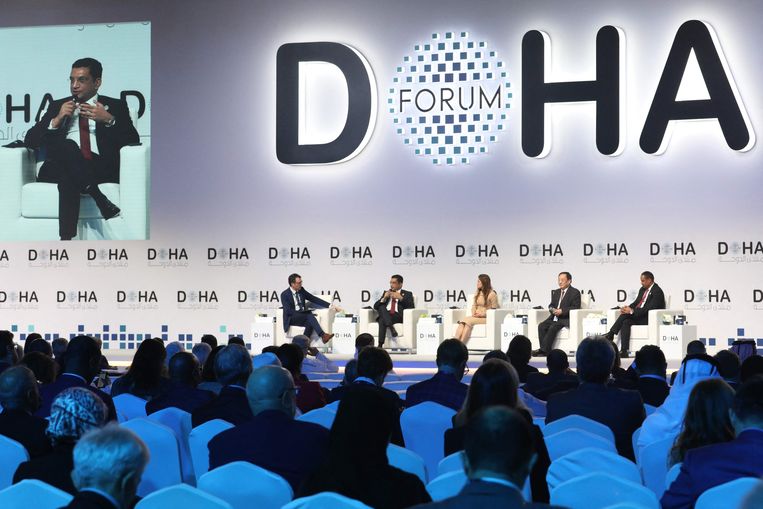BRICS, a partnership between emerging economies, will add additional seats for new members from January 1. Now that membership in the anti-Western group is more attractive than ever, China and Russia are working to expand further.
Even a personal message from Chinese leader Xi Jinping failed to calm the new Argentine Prime Minister, Javier Miley. He was his predecessor argentina, Economic love between Buenos Aires and Beijing, It concluded in August by joining BRICS, a non-Western group of large emerging economies led by China. However, in November, China-skeptic Miley thanked him for the honor.
The break is painful for Brazil, which wanted Argentina to join as a democratic addition to the other five newcomers to the BRICS group: Egypt, Ethiopia, Iran, Saudi Arabia and the United Arab Emirates. In 2023, forty countries were interested in membership, of which twenty were officially registered as BRICS candidates and six would officially become members as of Monday. This means that the waiting room is still full, so expansion will be discussed again under the Russian presidency in 2024.
BRICS has long been considered a joke by Western countries, ever since the company was founded in 2009 in the wake of the financial crisis in response to the G7. The differences between Brazil, Russia, India, China and South Africa were thought to be so great that they would amount to nothing at all.
Comprehensive ambition
But after fifteen years, the BRICS countries are gaining more power. Argentina's early loss is offset by the acceptance of important gas and oil producers from the Middle East. In the tilted world order, there is increasingly room for this club without obligations, except for the rule that members leave their mutual disputes at home to devote themselves to the larger goal: adjusting the global economic order to the benefit of non-Western countries. Whether through direct or indirect attacks on the West.
From this perspective, the arguments between BRICS members are not a weakness, but rather a sign of the attractiveness of this comprehensive ambition. Because it brings the two rivals, India and China, to the negotiating table without fighting over their border conflicts. Egypt, the United Arab Emirates, and Saudi Arabia have managed to overcome their previous difficult relationship with Iran. These kinds of internal contradictions would blow up many international companies. However, the BRICS countries are growing like crazy.
Creating the kind of loose ties, which demand an increasingly important role on the world stage, is a Chinese achievement. After the Shanghai Cooperation Organization, which focused on security issues, came the BRICS, followed by the seventy-member Friends of the Global Development Initiative, where admirers of Chinese President Xi Jinping's economic prescriptions meet.
A room for outcasts
The advantage of BRICS membership is that even international outcasts like Iran get diplomatic and economic space. This also explains Russia's deep desire for further expansion. Not only is Moscow organizing two hundred BRICS events in 2024 to show international support for Putin's “just world order,” there will also be a new BRICS annex called “Friends of BRICS.” This is a way to establish relations with countries that do not meet the criterion of acceptance, that is, members may not have formal security guarantees with alliances or countries outside the power bloc.
It is possible to distance these countries from the Western camp by using the growing economic weight of the BRICS group as an inducement. Who wouldn't want to be friends with a club that represents 43% of global oil production and 39% of the global economy, making it bigger than the G7?
While BRICS leaders face Western sanctions, Russia and China are also keen to weaponize the organization to reduce the impact of those sanctions. Creating a common BRICS currency similar to the euro is a pipe dream, but BRICS has managed to shake off the dominance of the dollar. This is due to Chinese initiatives to position the renminbi as a “red currency” against the “US dollar”.
Do not enter in dollars
China and Russia pay each other in renminbi. It is also increasingly possible to get the economies of the Global South to pay for Russian goods and services in renminbi. For example, Bangladesh's $12.65 billion Russian nuclear power plant is paid for in renminbi.
To pay off Argentina's recent debt to the International Monetary Fund, Miley borrowed $960 million from CAF, the development bank for Latin America and the Caribbean. But before taking office, Argentina's central bank used a currency swap with China's central bank to service IMF debt in renminbi.
Since 2023, Brazil has been using Cips, the Chinese alternative to Swift, as an international identification code for banks, to deal with Chinese companies without the intervention of the dollar.
Life insurance against the West
More countries in the Global South see the benefits of BRICS as a kind of life insurance against sanctions, should they anger the West themselves. The Russian central bank's asset freeze may be an experiment in Europe and the United States as the pinnacle of resolute unity against Putin's expansionism, but major emerging economies in the global South are shocked by the way the West is weaponizing the international financial system. .
The United States has also banned several Chinese companies for raising American dissatisfaction with Beijing over Chinese trade practices or human rights violations. That's why countries that don't know, given the current geopolitical uncertainty, which great power they would be better off with, think it wouldn't hurt to take a closer look at the economic giant BRICS this year.











More Stories
Revealing the ten countries that support Ukraine the most
Funny protest against mass tourism in Galician village
Kamala Harris has wind in her sails, but Trump can still win